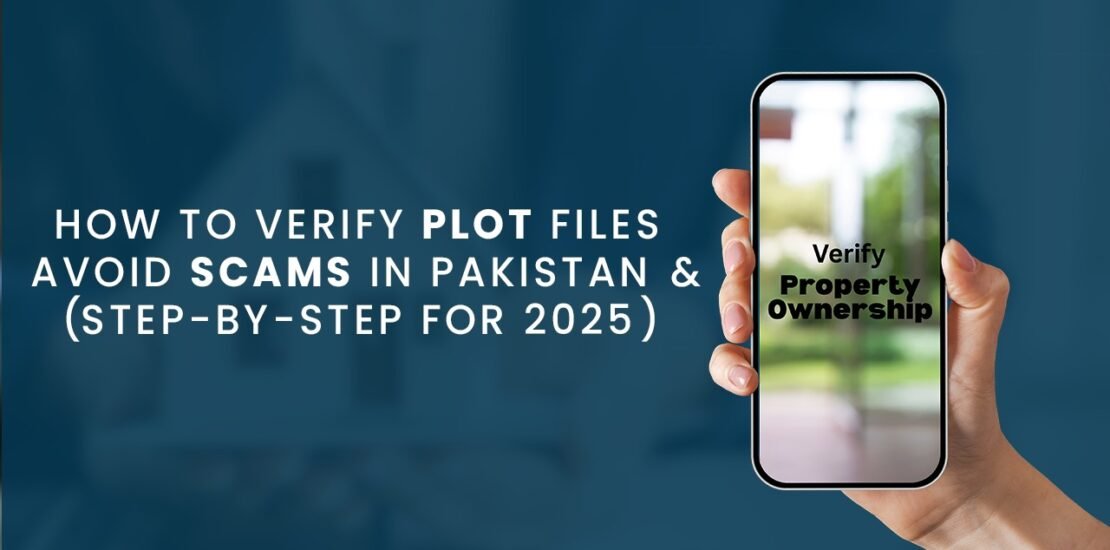- August 19, 2025
- Posted by: Muhammad Shehzad
- Category: Blogs

Worried you’ll end up with a sketchy file, fall for a pre-launch property scams, or get reeled in by some offer that’s just too shiny to be real? Yeah, join the club.
Pakistan’s real estate scene in 2025 is still a wild cocktail of solid investments and absolute landmines. Here’s a no-nonsense playbook to help you actually check if a plot file is legit, no guesswork, just real steps: official portals, e-stamp checks, and the works. Save yourself the heartbreak and your cash.
What You’re Actually Gonna Do To Avoid the Risk of Property Scams
- Scope out the society’s legal status on the right authority’s website (CDA, RDA, LDA, PHATA, whatever fits).
- Make sure your file links to a real, approved project (NOC/LOP in hand, not chilling on some blacklist).
- Check the seller/developer’s background (SECP registered? FBR filer? Or just some uncle’s cousin?).
- If it’s an actual plot, run it through provincial land records (PLRA, Sindh BOR, KP—the usual suspects).
- Double-check e-stamp papers and transfer process using official systems (PITB, CDA’s One Window, etc.).
- Swing by the society’s transfer office, verify the file number, block, dues, and whether it’s even transferable before you drop the cash.
Step 1: Is the Housing Scheme Legal? (NOC/LOP Check)
First things first: don’t just take the agent’s word for it. Go check that NOC (No Objection Certificate) and Layout Plan (LOP) yourself. Here’s the drill:
- Islamabad (CDA): Hit up the official CDA list for private housing schemes with NOC/LOP status. Also, comb through their blacklist of illegal/unauthorized societies. Don’t get stuck with a “ghost” plot.
- Rawalpindi (RDA): Use RDA’s “Status of Approved Housing Society” page. They’re pretty blunt about avoiding fake or unapproved schemes—double-check if your society is on PHATA’s radar, too.
- Punjab (outside LDA zones)—PHATA: Projects out in the burbs? PHATA probably runs the show. RDA even says so: confirm PHATA status, especially near the twin cities.
- Pro tip: If you hear, “NOC in process,” treat it like a hot stove. Don’t touch. Only invest if you can see the approval on the actual authority’s website—or get something official in writing.
Step 2: Confirm File Details with the Society’s Transfer Office
Call or better yet visit the society’s official transfer/record office:
- Get them to confirm the file number, block, sector, category, balloting status (was it even in the ballot?), and any outstanding dues.
- Ask for a “dues clearance letter” and whether the file can even be transferred (some are locked for months).
- If their website has online verification, fine, but always double-check in person. Trust issues, you know?
Red flag: “Affidavit/open files” with only cash payments and zero receipts. Yeah, that’s a trap.
Also Read: How DHA Gandhara Aligns with Islamabad’s Urban Expansion Strategy 2030
Step 3: Check Seller/Developer Credibility (SECP & FBR)
- SECP Company Search: Search up the developer/marketing company on SECP’s portal. If they don’t exist there, run.
- FBR Active Taxpayer List (ATL): Check if the seller/developer is a filer. Non-filers pay more in taxes and, honestly, it’s a basic credibility check. Use FBR’s ATL portal or just shoot an SMS (“ATL CNIC/NTN” to 9966).
Step 4: Don’t Get Punked by Fake Stamps (E-Stamp Authenticity & Transfer)
Fake stamp papers are still a thing. Can you believe it? If you’re in Punjab:
- Use PITB’s e-Stamping portal to check e-stamp numbers. Don’t mess around with manual stamp papers; those get faked all the time.
- If you’re transferring a CDA (Islamabad) property, read up on their official transfer process to make sure you’re not missing any weird documentation.
Always pay with Pay Orders or Bank Drafts made out to the company/society—not some random. Keep every receipt, no matter how small.
Step 5: If It’s an On-Ground Plot, Dig Into Land Records
Buying a real, on-ground plot (not just a “file”)? Here’s what to do:
- Punjab: Use PLRA or visit an Arazi Record Center for the official Fard/ownership proof.
- Sindh: Check the online land records portal at Sindh BOR.
- Khyber Pakhtunkhwa: Book an appointment on KPLR’s digital portal for land record services.
Islamabad societies usually transfer via CDA or the society’s own office, not provincial BOR—but if it’s a proper leasehold/on-ground plot, it should still tie back to a legit title chain. Don’t skip this.
Step 6: Cross-Check the Paper Trail (Before You Pay!)
Ask for all the documents and actually match them to reality:
- Original allotment or transfer letter—direct from the society, not a photocopy from 2005.
- All receipts for payments (down payments, installments, etc.).
- NOC/LOP reference and project name, spelled exactly how it appears on the authority’s website—typos matter here.
- Seller’s CNIC + transfer forms that the authority wants (CDA One Window, etc.).
Don’t get lazy, one missed detail and you’re stuck with a dud file. Stay sharp, ask questions, and never, ever let someone rush you into paying. If they push, that’s your cue to walk.
Step 7: Spot the Red Flags (Don’t Get Burned)
Alright, you wanna dodge property scams in Pakistan? Keep your eyes peeled for these sketchy moves:
- “Pre-launch” or files that aren’t even approved yet? Yeah, that’s a nope.
- Massive “one day only!” discounts—if it sounds too good, it probably is.
- Cash deals with no receipt? Run. That’s classic scammer behavior.
- If you can’t transfer your file at the society’s office, something’s fishy.
- Oh, and if the society pops up on the CDA or RDA’s blacklist? Game over, walk away.
FAQs for 2025
Q1: File vs Plot—what’s the big deal?
So, here’s the thing: a “file” is just a piece of paper saying you might get a plot someday. No number, no spot on the map, nada. A plot? That’s the real thing, balloted, numbered, and you can actually see where it is. Never hand over money till the society confirms the status in writing at their transfer office. Trust, but verify.
Q2: Can I trust a flashy brochure from the society?
Nope. Only trust what’s on the official regulator’s site (CDA, RDA, LDA, PHATA, etc.) or get it in writing from the actual authority. Brochures are just marketing fluff.
Q3: I’m overseas—how do I check stuff from abroad?
You’ve got options.
- Check CDA/RDA lists online to see if the society’s even legal,
- look up the developer on SECP,
- make sure the guy selling is a registered filer (FBR ATL),
- use PITB e-Stamp for stamp paper checks,
- and always ask for society confirmation by email or letterhead before sending any cash. If someone’s dodging these steps, they’re hiding something.
Real Talk: Our Two Cents
Look, in 2025, the smart play is to demand proof at every turn, whether that’s a legit NOC from CDA, proper e-stamp verification, a clean SECP record, or solid land registry docs. If you spot ANY gaps, don’t let FOMO get you. Deals come and go, but you’ve only got one wallet. Don’t let anyone mess with it.
Property scams are common now a days in Pakistan. You can stay safe when you know all the nitty gritty or atleast can sense the red flags. This guide is your homework to avoid property scams.
Bookmark These—Official Links You Actually Need
- CDA: Islamabad housing schemes + illegal society list (seriously, check this first)
- RDA: Rawalpindi societies status & public warnings (live updates—thank me later)
- PITB e-Stamp: Punjab’s online stamp verification
- PLRA: Punjab land record lookup (aka “Fard”)
- Sindh BOR: Registry search for Sindh
- KPLR: KP’s digital land record system
- SECP: Company search for shady developers/marketers
- FBR ATL: Double-check if your seller’s actually a tax filer
Do your homework. Don’t get hustled.
